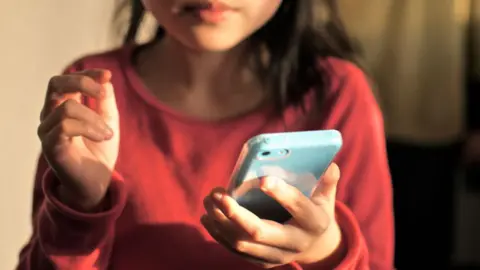 Getty Images
Getty ImagesThe argument over smartphones in schools has been “won”, the technology secretary Peter Kyle has told the BBC, saying schools are voluntarily choosing to restrict their use by pupils.
He said that in the area he represented in the south east of England he was not aware of “a single school” that allowed the devices to be used “freely” during the school day “and certainly not in classrooms”.
The government has stopped short of banning smartphones but has issued recent guidance to ensure that all schools implement effective smartphone-free restrictions.
However the campaign group Smartphone Free Childhood says firmer action is needed to remove the devices from the schools.
“This is an urgent situation that needs immediate government support,” its co-founder Clare Fernyhough said.
Kyle made his remarks as the US and UK announced their first joint agreement aimed at keeping children safer online.
It will see the setting up of a joint online safety working group to share evidence and expertise, and study the impact social media has on children.
Kyle said the agreement would turn the two countries’ “historic partnership” towards “delivering a safer online world for our next generation.”
However Smartphone Free Childhood told the BBC it was insufficient and parents “don’t have time to wait and see whether this UK-US agreement makes any difference when their children’s futures are at stake.”
Limited evidence
The agreement was announced in a joint statement between the two countries.
At its heart is the joint working group which will work on areas including “promoting better transparency from platforms” and “better understanding the impacts and risks of the digital world on young people, including new technologies like generative AI.”
The UK government acknowledged that “currently there is limited research and evidence on the causal impact that social media has on children and young people”.
One researcher welcomed moves in the agreement to address this.
“Policies and guidelines to support young people in navigating their digital world need to be based on robust evidence, but to date we haven’t had much success in establishing cause and effect when it comes to impacts on wellbeing,” said Prof Pete Etchells of Bath Spa University
The US and UK also said they expected tech platforms to go “further and faster” to protect children.
Challenged if this was really sufficient to persuade them to act, Kyle said “seeing two countries like America and the US coming together, the tech companies will realise that we really mean business, that there’s nowhere to hide when it comes to the protection of our citizens and our children”.
In a statement U.S. Secretary of Commerce Gina Raimondo said the United States was taking the necessary steps “with our UK partners, to protect children’s privacy, safety, and mental health,” she added.
The UK’s Online Safety Act does place duties on online platforms to protect children’s safety and put in place measures to mitigate risks.
But this is not yet fully in force. Guidance for firms on how to comply with the new legislation is still being produced by the communications regulator Ofcom.
Professor Sonia Livingstone, Director of the Digital Futures for Children centre said enforcing those and other rules was of the utmost importance.
“The priority for US-UK cooperation is surely that UK and European legislation is respected in the US and therefore implemented by companies headquartered there,” she told the BBC.

